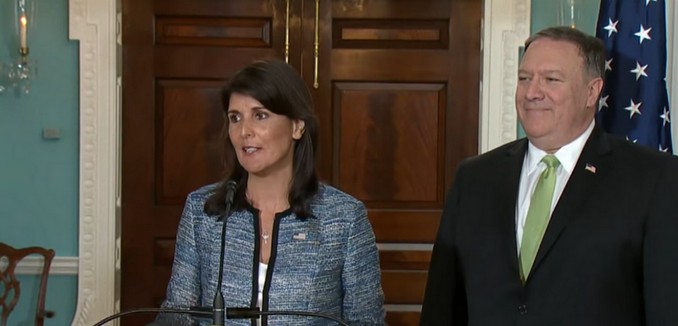What happened?
• The U.S. will withdraw from the U.N. Human Rights Council, Secretary of State Mike Pompeo and U.S. Ambassador to the U.N. Nikki Haley announced Tuesday.
“The US is officially withdrawing from the UNHRC. This step is not a retreat from human rights commitments,” Haley said, charging that the U.N. forum is a “hypocritical and self-serving organization that makes a mockery of human rights” and “is not worthy of its name.” Pompeo described the Council as “an exercise in shameless hypocrisy” and said it had become “an obstacle to progress and an impediment to change” by providing cover for repressive regimes.
• The council, Haley added, has a “chronic bias against Israel.”
Why did the U.S. withdraw?
• The decision to withdraw from the Council comes after more than a year of threatening to exit the forum, calling for reform, and accusing the body of a pathological anti-Israel bias.
• The White House, according to U.S. officials, concluded that its efforts to reform the Council had failed, and that exiting the body was the only step it could take to demonstrate its seriousness.
Haley said, “Regrettably, it is now clear that our call for reform was not heeded.” She added that if the Council reforms, the U.S. “would be happy to rejoin.”
• Haley specifically called out China, Russia, Cuba, and Egypt for blocking reform efforts, charging they had prevented change to protect their own repressive actions.
• Haley also attacked the Council for including serial human rights violators among its ranks and not speaking out against those member states. The ambassador specifically cited countries like Venezuela and Congo, both of which are currently members of the Council.
“When a so-called Human Rights Council cannot bring itself to address the massive abuses in Venezuela and Iran and it welcomes the Democratic Republic of Congo as a new member, the Council ceases to be worthy of its name,” Haley said.
What’s the mandate of the Council?
• The U.N. Human Rights Council was established in 2006 after its predecessor, the Human Rights Commission, was disbanded by then-Secretary General Kofi Annan over concerns of a “credibility deficit.” Comprised of a rotating membership of 47-member states, the Council is the highest body in the U.N. human rights system.
UNGA Resolution 60/251 (2006) states, in Article 2, that the Council is responsible for “protection of all human rights and fundamental freedoms for all, without distinction of any kind and in a fair and equal manner.” Article 3 states that the Council should address “situations of violations of human rights.” Article 4 states that the work of the Council shall be guided by the principles of “universality, impartiality, objectivity and non-selectivity.”
• Opposition to the U.N. Human Rights Council isn’t unprecedented and has been the policy of previous U.S. administrations. The U.S. only joined the body in 2009 under President Barack Obama, whose administration argued that U.S. membership could influence the Council’s behavior.
Who sits on the Council?
• Contrary to its declared purpose, the organization has systematically turned a blind eye to the world’s worst criminal regimes and their crimes against humanity. Paradoxically, many serial violators of human rights are themselves Council members.
• Currently, members of the Council include Qatar, Congo, Venezuela, China, Cuba, Iraq, Pakistan, Afghanistan, and Burundi.
What’s Agenda Item 7?
• Agenda Item 7 is the clause which mandates a discussion on Israel at every session. It operates under the title: “Human rights situation in Palestine and other occupied Arab territories,” with the sub-title of “Human rights violations and implications of the Israeli occupation of Palestine and other occupied Arab territories; Right to self-determination of the Palestinian people.”
Israel is “singled out in a way that no other country is singled out,” by the stand-alone focus that is engraved in the Council’s permanent agenda, Haley said, leading to discriminatory treatment of the Jewish State at every Council meeting.
What’s the Council’s record?
• From its inception in 2006 until May 2018, the Council held 28 special sessions. Of the 22 sessions that singled-out specific countries, more than 30 percent have targeted Israel.
For example, 8 sessions were held on Israel, while only 5 addressed the mass murder in Syria; 2 ethnic cleansing of Rohingya Muslims in Myanmar; and only a meeting each was held on serious human rights violations in countries like Congo, Libya, South Sudan and Burundi.
• From its inception in June 2006 until June 2016, the Council adopted 135 resolutions criticizing countries; 68 out of those 135 resolutions have been against Israel, more than 50%.
For example, 20 of 26 UNGA condemnatory country-specific resolutions (or 77%) in 2016 exclusively targeted Israel. There were only 3 on Syria, and one each on Iran, North Korea, and Crimea.
What are other countries saying?
Israel
• Israeli Prime Minister Benjamin Netanyahu welcomed the U.S. withdrawal from the Council: “Israel thanks President Trump, Secretary of State Pompeo, and Ambassador Haley for their decision against the hypocrisy and lies of the U.N. Human Rights Council. For years, the Council has proved itself to be a biased, hostile and anti-Israeli body that is betraying its mission to protect human rights.”
Britain
• Britain on Monday called on the Council to end its discriminatory treatment of Israel. “We share the view that the dedicated Agenda Item 7 focused solely on Israel and the Occupied Palestinian Territories is disproportionate and damaging to the cause of peace,” Johnson said. The minister threatened that “unless things change we shall vote next year against all resolutions introduced under Item 7.”
Australia
• Australia’s Foreign Minister Julie Bishop responded to the decision, saying Australia shared “many of the concerns held by the US”, particularly about the Council’s “anti-Israel bias”, but that Australia was “disappointed” by the U.S.’s decision to leave. Last month, Australia and the U.S. were the only two countries on the Council to vote against an independent investigation into the deaths that occurred during the Hamas-orchestrated Gaza border riots.




